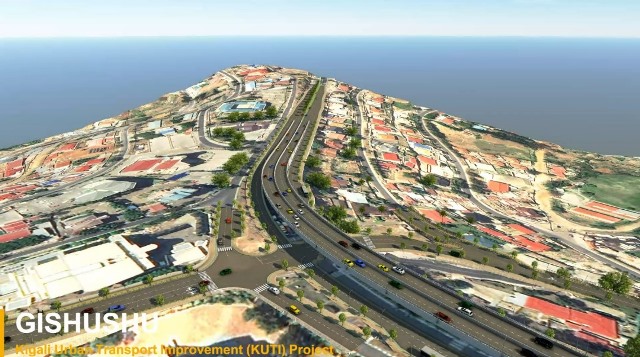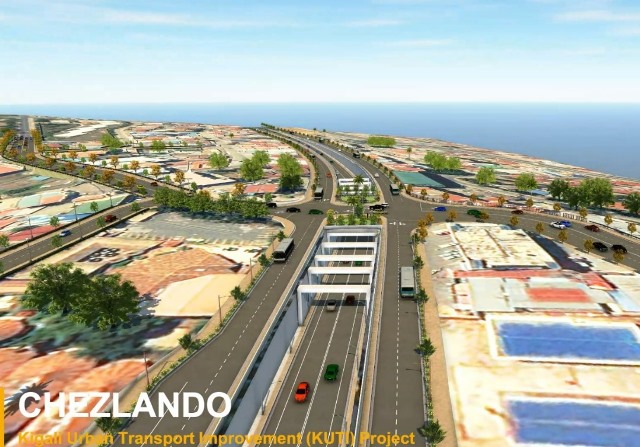Kigali, one of Africa’s fastest-growing cities, is on the cusp of a major urban mobility transformation.
At the centre of this change is the Kigali Urban Transport Improvement (KUTI) Project—an ambitious, multimillion-dollar initiative designed to streamline the city’s transport network, reduce congestion, and boost public transport accessibility.
Backed by a $100 million loan from the African Development Bank (AfDB) and coordinated by the Government of Rwanda through the Rwanda Transport Development Agency (RTDA), the project will cost an estimated $279 million in total and be implemented over five years.
The KUTI Project is expected to have a profound impact on Kigali’s transport infrastructure and economic growth.
What the KUTI Project Covers
The KUTI Project targets several critical aspects of Kigali’s urban transport system, including, among others:
- Upgrading Seven Major Junctions: Key bottleneck areas such as Chez Lando, Gishushu, Gisozi/Kinamba, Nyabugogo, Rwandex, Sonatubes, and Kibagabaga will see the construction of underpasses, flyovers, and road widening to improve traffic flow.
- Multimodal Transport Hub: A centralised hub is planned to integrate various transport services—buses, taxis, and non-motorised transport options—into a cohesive system.
- Bus Priority Lanes: Dedicated lanes for public buses will reduce delays and improve service efficiency, making public transport a more attractive option for commuters.
- Non-Motorised Transport (NMT): The inclusion of pedestrian walkways, cycling lanes, and pedestrian bridges aims to promote safety and accessibility, especially for vulnerable road users.
What is the driving force behind the project?
With Kigali’s population expected to swell from 1.7 million today to 3.8 million by 2050, city authorities are aware that current infrastructure must evolve.

Speaking during a press briefing recently, Dr. Jimmy Gasore, Rwanda’s Minister of Infrastructure, highlighted the urgency:
“Designs were completed. We project that in July, we will start with the Chez Lando and Gishushu junctions. These are critical points that will unlock flow in the central business areas.”
His remarks came as the government finalised procurement processes for the first phase of construction.
RTDA, which is managing the technical aspects, sees the project as an opportunity to embed sustainability and climate resilience into Rwanda’s infrastructure. The agency has already conducted a full Environmental and Social Impact Assessment (ESIA) and a Resettlement Action Plan (RAP) to minimise disruption. About 664 people are expected to be affected, and fair compensation has been planned.
City of Kigali takes charge of Urban Public Transport
The City of Kigali is a key implementation partner, especially on public transport reforms that complement the KUTI infrastructure upgrades.
According to Mayor Samuel Dusengiyumva, the city is determined to resolve public transport inefficiencies by increasing the number of operators and modernising systems:
“We anticipate that the introduction of multiple operators per route will foster a competitive environment, ultimately reducing waiting time at bus parks and bus stops. Our goal is to enhance the efficiency of public transport, encouraging more residents to utilise this service.”
The city recently welcomed 18 new public transport operators, further setting the stage for a shift in commuting behaviour.
Strategic alignment with Vision 2050
KUTI is closely aligned with Rwanda’s Vision 2050 and the National Strategy for Transformation (NST1). It is part of a broader strategy that includes the Rwanda Urban Mobility Improvement (RUMI) Project, which seeks to expand and modernise the entire urban transport system in Kigali.
In another boost, Rwanda has secured a $14.6 million grant from Japan to develop intelligent transport systems in Kigali. These systems will feature smart traffic lights, surveillance cameras, and traffic flow algorithms to complement the KUTI infrastructure.
Looking ahead
The Kigali Urban Transport Improvement Project is not just about roads—it’s about people, productivity, and environmental sustainability. As implementation begins, the residents of Kigali can look forward to a future where commuting is safer, faster, and more predictable.
For a city striving to become a model of green urbanisation in Africa, KUTI marks a turning point.
